Why You Like Fantasy: Part 2 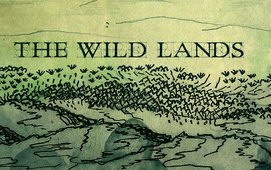 To ask questions about the nature, importance, and quality of art is one of the deepest pools I have ever looked into. For a time I had the privilege of joining a local group of artists, of which many were fine artist, to discuss the question of “What is good art?” Just remembering those days is like stepping up to the edge of that deep pool with the intent to dive. But I don’t mention this because I wish to dive into it with this blog post. Rather, I mean to discuss the vital role of one of the arts, namely, Literary Fantasy. It is a genre that I grew up reading, grew fond of, and have put my “pen” to for the last 12 years. As part of this journey I have wondered why I like it, why other people like it, and sometimes, why people don’t. It’s the first question of liking it for which I’d like to propose another answer. My first answer was in Part #1 of this post. Here is my second answer: "We like fantasy because it frees ours minds to see our world more clearly.” In 1939, when he was still in the early stages of creating Middle Earth, J.R.R. Tolkien gave a lecture called “Fairy Stories.” It was later adapted into essay form, entitled “On Fairy-stories,” and can now be found in one of his compilations, “Tales from the Perilous Realm.” In his lecture-turned-essay, Tolkien tackled this very idea of the importance that Fantasy plays in freeing our minds to see life more clearly. In so many words, Tolkien spoke of how life becomes trite over time by nature of how we approach it, categorize it, and then write it off. Fantasy helps us to “clean our windows,” and “see things as we are meant to see them.” This triteness is really the penalty of “appropriation”: the things that are trite, or (in a bad sense) familiar, are the things that we have appropriated, legally or mentally. We say we know them. They have become like the things which once attracted us by their glitter, or their colour, or their shape, and we laid hands on them, and then locked them in our hoard, acquired them, and acquiring ceased to look at them … Creative fantasy, because it is mainly trying to do something else (make something new), may open your hoard and let all the locked things fly away like cage-birds. (J.R.R. Tolkien, "On Fairy-stories") There is something very similar in these two answers for why you and I like fantasy literature. That we need consistent recovery, a freeing of our minds to be able to see our world clearly, only serves to confirm that this world dulls us. What gets dulled is by nature meant to shine. This speaks of a higher nature, it points to a greater reality – that we were made for another world. Perhaps this is all just musing, a complication of something silly to make it sound important. Or, perhaps it is a tiny glimpse into what is really true, and most important about us as human beings. I feel very confident that the grappling of the human heart and mind with “other things” is not merely a distraction from the all-important present. There is an immaterial spirit about us that links to another world, a larger reality. And a link is a connection, not a one-way pass to leave one thing for another. Both sides matter. Well, that is enough philosophizing for now, I think. Back to letting “locked things fly away.” Why You Like Fantasy: Part 1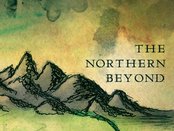 Did you know that not everyone likes fantasy? It’s shocking, I know. Well, for those of us who do like fantasy, this post is especially for us. To everyone who dislikes fantasy, perhaps I will make the case someday as to why they need it. But, let me stay on topic for the time being. My premise in this post is a simple one, namely, that an enjoyment of fantasy fiction (and I would wrap sci-fi into fantasy) is really just a sign of a deeper truth about the human soul. That truth is about who you are as a human being. Someone much smarter than me said it very well: "Creatures are not born with desires unless satisfaction for these desires exists. A baby feels hunger; well, there is such a thing as food. A duckling wants to swim; well, there is such a thing as water. Men feel sexual desire; well, there is such a thing as sex. If I find in myself a desire which no experience in this world can satisfy, the most probable explanation is that I was made for another world." (C.S. Lewis) I know lots of folks who would say that reality itself provides more than enough excitement for a man or woman as is, and that another “realm of adventure” is really not necessary. Consequently, many of them don’t care much for fantasy. I agree with them in the sense that life can be crazy, if not well able to consume me at times, like, literally eat me alive, or chew me up and spit me out. When I read a fantasy, it’s not because I wish I could add to my life the stress of being chased by orcs, or having a dragon try to roast me like a duck, but because I have a certain desire to be somewhere I am not. That is the key. Have you ever felt as if there is nothing in this world that can truly satisfy one of your specific longings or desires? I’m not talking about simple discontent. I’m talking about that longing that has caused men and women throughout the ages to pursue a life of isolated meditation, god-like feats of endurance, or pleasure to the point of destruction – all in a seeming effort to “find themselves,” or reach a new height. I have most certainly felt it. I’m willing to bet you have too, in some capacity. I think it is because you and I are human beings - mind, body, and spirit, bound together to make a whole. We live in a temporal, physical world, as eternal, spiritual beings. In this state, it’s as if something is missing, or hidden. I think Fantasy is a craft that helps us find a piece of that other world, feel it, and even connect the dots that we are very much eternal, spiritual beings. We are here on earth, and we belong here in one sense, but in another, we belong somewhere else. This is not to say of course that all fantasy is healthy or good for consumption, as there are dimensions of spirituality that are not healthy, and maybe even perilous. But even this is something we can learn in part by reading a story that transports us to other places through the cracked door of our imagination. You and I, my friends, are made for another world, and that other world exists. In going to the world of a fantasy story, we are able to touch some part of it. This is not a desire that should be crushed for its impracticality or danger, but rather a desire that needs to be informed, and directed. If we are made for another world, we will go there someday. Perhaps the bigger questions are, "Which world?" or "Will we be ready?" 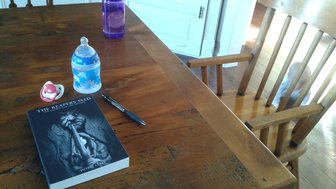 A few blog posts ago, I spoke about the reality of finding time to write as someone who does not write novels for a vocation. I mentioned a popular quote and idea of "Writing on the edges of the day." Well, I'm building on that and I think it's become a more free-flowing, grab-any-moment-you-can sort of scenario for me: "Write between diapers." I am the incredibly blessed father of two beautiful children, ages 3 and 10 months. It feels like life is squeezed in between diapers, and crying, and messy meals, and sweet story times, and . . . you get the idea. The "edges of the day" are getting thinner by the moment! I think what I'm realizing more and more as I try to forge my way to the end of Book 3 of "The Reaper's Seed," is that life is at odds with my writing. The tension is not surprising, but wow . . . it is so hard to keep producing these days. It's a good thing I like endurance sports. The sustained commitment to a long-term goal with the hope of gain translates far better than I would have ever thought. And at least writing can actually fit in between diapers. I can't say the same for endurance sports. (Sigh. You can't do it all). Keep dreaming, my friends. Dreams don't die in the face of (wonderful) responsibilities, they just . . . take longer to realize. : )  As 2016 draws to a close, I am reflecting on some of the decisions I've made as a writer, and also as a publisher. Being an indie author kind necessitates the two: artist twisted around entrepreneur. It's caused some me to learn some real lessons. The sum of it is that I spent 2016 breaking a number of rules. Specifically, rules of writing, self-publishing, business savvy, etc, etc. Why? Because I wanted to - I was being a bit contrary, in a way, but in all honesty, most of it was simply because I wanted to have fun. I know that doesn't sound right, but I'll explain. Pick a Genre & Master It The first rule I broke in 2016 was to take a hiatus from writing my epic fantasy series, The Reaper's Seed to complete a mixed genre novel I'd starterd writing back in 2010: The Nobleman. If you search the wide world of web opinion (and wowsers, are there some), it's not a real good idea for someone trying to establish themselves in an art to jump around from one art form to another. Writing is no different. Even if you do make it big as an author in a certain genre, it can be pretty hard to mix it up. J.K. Rowling was so successful with young Potter that she has created an alter ago by the name of Robert Galbraith to venture into writing mystery novels. Hmmm. Well, I just spent the last year bucking that good advice. But let's just remember, such advice is for the writer that wants to make money and establish him or herself with writing as their day job. Inner Self: "Wait, . . . I thought that was what we were trying to do? I've been working hard at this!?" Self: Well, yeah, but . . . I wanted to have fun and play. Don't Go Until You Know Not only did I spend 2016 writing a novel outside of the genre and audience that I was only beginning to find footing with, I decided that I was going to publish it as a serial novel online. A smart businessman or two encouraged me to reevaluate my idea given the fact that I was jumping genres/audiences, and that I still hadn't really built a fan base. I had what I still think are some really good ideas, but once again, I was thinking like the author who had already made it and had several hundred thousand fans ready to try whatever ink I dropped on paper. Hmmm. I did it anyway, as seems to have been my style as of late, had a lot of fun, but ultimately just discovered an expensive hobbie. Inner Self: "If you want an expensive hobbie, we could have kept at the triathlon thing and stayed in really good shape at the same time! C'mon!" Self: It could have worked. And it's not money that measures success, but the love of creating. Inner Self: "What about a loss of money? Does that measure success?" Self: Moving on. Conclusion In gearing up for 2017, and the potential completion, publication and sale of both Book 3 & 4 of The Reaper's Seed, I'm looking back on 2016 as a formable year in my artistic identity. In fact, I've actually double down on my "bad decision" in a sense. I wouldn't take it back. Writing and publishing The Nobleman was fun, and I have two more novel ideas like it that I hope to write some day. So, I've branded myself as a multi-genre author. We'll see whether that's really such a great idea over the next stretch. But, in the meantime, it's back to the epic fantasy. I left a lot of characters in the lurch! 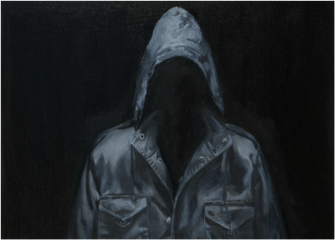 When most people pick up the latest bestselling thriller or murder mystery, they are typically looking for some good entertainment. Makes sense, and with that expectation, they better get what they are seeking or there will be a let down. I've read quite a few murder mysteries and a short list of crime thrillers and that was my expectation too. But the stories that linger in my imagination, repeat in my daydreams, and give me metaphors for life are not the usual genre fiction. I like to be wowed, but I like even more to be left thinking about characters, analyzing their plights, victories, and struggles. Many fast paced thrillers can only go so deep in a high speed pursuit of the plot. I began writing The Nobleman years ago while my wife was slaving away on her masters degree. With no toddlers to chase, i.e time on my hands, I took a break from writing the fantasy series I'd been working on (The Reaper's Seed) to venture into a plot line that had been on my mind. I began with a new writing voice, and an idea that fit well into a murder mystery/thriller-like drama. At the same time I began writing this story, I had been doing a lot of thinking about "equality." Specifically one of the opening lines of the Declaration of Independence: ". . . that all men are created equal, that they are endowed by their Creator . . ." That next part about the government securing these rights was the political hot topic, but I was enamored (and still am) with the fundamental importance of the Creator part. To me it was, and still is, the keystone to a healthfully functioning American government. Also around the same time, I had watched and greatly enjoyed a movie called "Crash." For some it was just an edgy, racially charged film, but to me it was inclusive in the way that it showed the ability for all sorts of people in all walks of life to make the right or wrong choice when faced with adversity. It felt to me to be a wonderful expression of equality: all equal in the the value given them by their Creator, but all broken to one degree or another. It resonated with me. And so, getting back to The Nobleman, I found these thoughts and debates energizing my characters and the development of them. The Nobleman became a mixed-genre novel that is filled with people of various races, sexes, vocations, and economic status. Here's how they are all the same: they are all broken. But I took it a step further in this way - the characters in The Nobleman are all created in the image of God, their Creator, and . . . they are broken. This very much expresses how I see the world. Mankind is a very special part of creation, but we are a messed up species. The sheer volume of evil in this world is staggering. But that is not the end of it - we are capable of doing beautiful things. So what is it? Are we naturally bad with the ability to do good? Or are we naturally good with the ability to do bad? Can anyone actually be a noble person? Or is it that we only ever think we are doing the right thing, only to find that hindsight finds us as lacking? I would encourage you to ponder and puzzle out that question. My own answers to this complicated and very important question are rooted in my Christian faith. Who fills the jacket? Who fills the trench coat? Who wears that hoodie? People are the point and the problem. I've definitely written The Nobleman to entertain, but I hope reader's will also find some depth where they may not have expected it. 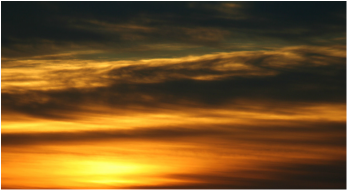 If there is one way I would describe the last three months, it would be "writing on the edge." I know, it's been three months since my last blog post, so that begs the question: what exactly do you mean, "on the edge?" I don't mean to say that writing, or trying to write has me standing on the edge of a cliff ready to jump. That would be more like the desire to write without the time. And I don't mean to say, necessarily, that my writing has been edgy - so new and exciting that I'm on the outskirts of the craft. (Perhaps one day). What I mean to say is that I have been writing on the edge of life. Literally, the edges of the day. There is a very popular quote from Toni Morrison that came in response to someone asking her when she found time to write: "On the edges of the day." I think I can relate. Between a day job, my wife, children, a house (that I am trying to renovate), a large garden that I greatly enjoy, yard work, exercise, and my community of faith, there is no time. All that is left is the edges. Appropriately so, I might add. So I'm no complaining, don't get me wrong. Waking up at the crack of dawn (in mid July), or well before the sunrise is a privilege. I find at this time in my life I have a vision for writing. I have a thirst for it. I have a drive that I can keep alive simply by the art of imagining what my characters really would do in a present situation. And at times, I simply have to wake up to complete unfinished business. People live are at stake! And I want to know how I can better describe a scene, a person, a smell, a sound. I want to figure out how to use words, and combinations of them that enter the reader's head and and paint a picture, giving them feelings that they wouldn't otherwise have in the course of their day. And in the same way that the sunrise and sunset are some of the most beautiful times of the day, I'd like to think I've been capturing some beautiful writing. I guess the readers will decide. Soon, very soon, I will be sharing some of what I've been spinning in the wee hours of the morning, and after the children are in bed. "The Nobleman" is coming soon. 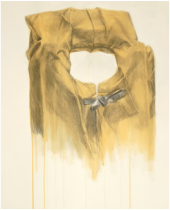 As you may or may not know, I am in the throws of writing, Kickstarting, and building a website where I will publish a serial novel by the name of, "The Nobleman." If you were to ask me what the novel is about, I would say it is a murder mystery and crime thriller that is heavy on drama. It is a murder mystery, and it is a crime thriller, but it is a thoughtful commentary on human nature at the same time. What it becomes at that point is just ... "The Nobleman." How did I come to write this story? Like most of the stories I come up with, it started out as simple as a one sentence idea. Then, it grew to two sentences, then I started to write an outline. As I wrote the outline, the story began to take form, and things that I saw, heard, remembered, and had seen soon influenced it. My world views became involved. I stepped outside of the writing styles I'd worked with before, and allowed the pictures on the big screen of my mind to find words. Also, I stared at paintings like the one in this post. I am not a visual artist. I think, I would call myself a cerebral artist, with only one well-functioning filter. My art comes out in words. But here is where paintings like the one in this post relate to my writing. I could write a thousand words about this painting, no problem. Included would be ideas of helplessness, determination, transience, salvation, false assurance, how water is a source of life and death, and on, and on, and ... you get the idea. A picture is worth a thousand words. But, while again, I acknowledge that I am not a visual artist, I am guessing, that in much the same way, a thousand words is worth a picture. Herein lay the reason we need visual arts, and writing, and why they go well together. In fact, I'll go another twelve inches out on my existential branch to say: the more we partake of both visual arts and writing, and allow them to interact and build each other up, the more alive we will be. Just a few thoughts while my two-year old daughter mangles her eggs and toast on a Saturday morning. 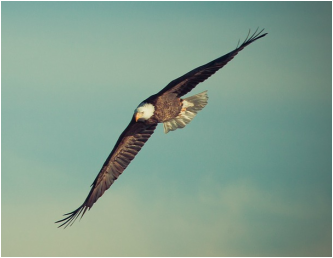 An expanse of open blue rippled as with waves, covering worlds unknown, unseen, yet unformed at His command. Complete in Himself, in His joy and His reign, the First One from whom light comes soared over it all. Content within Himself, He existed on His own and for His own. This is how it had always been, since before there was a before, for time and its captives cannot understand what lay beyond its limited dimensions. What was He, you ask? He is the One, the First One, of untouchable excellence and a mystery too wonderful for us to grasp. We all have a beginning, but he did not. He is a being, if being He be, from which all else has come, and in whom all things find their design and purpose, thus without mention, completion. If I were to go on, my descriptions would fade into a loop, as I am no more than a man. He is too great to be called great in our tongue. If light comes from him, then from where came darkness? Ah … to that, and so many more things I will speak, for we will at last arrive there, but first we must start with The Cry. In a place that was not a time, He desired to share what He was, and what He could give with something of His own design. So He soared higher, or further still, to begin a beginning as only He could. With a Cry that had never been heard and will never be heard again, the First One called a new order to the expanse of blue. There, beneath Him, the expanse willingly obeyed His Cry and became ordered in forms of land and water. Illumined by His great light, a world came to be, simply by His will, out of nothing but the great blue expanse. Enjoying what he had done, the First One carried His Cry forward for more, and from the land sprang plants of every kind, mountains, and by nature valleys, full of life. Shades of every rich and bright color burst forth, expanding their reach over the expanse of earth, from water’s edge to water’s edge. Scents of sweet and bitter, rich color that could now be felt filled the space between the land and the sky. But in the midst of all this reflection of His beauty and life, this new world was completely quiet apart from the Cry. The First One longed to be heard, and for his design to respond to Him in his great beauty. Thus the Cry called forth yet another kind of design from among the hills, the plants and the water. Beasts great and small, on every surface, with expressions of every kind moved, called, and sang back to the First One with a song of thanks and adoration. With ebb and flow they moved together, His expression of creativity, for Him, and because of Him. Pleased with his work, the One who uttered The Cry descended toward His design. And as He did, the highest mountain reached yet higher, into what remained of the great blue expanse, to provide a place for Him to stand. His two feet struck the rock, and there he took a form that was fitting for Him to show His design. A King He became to show his great might, with an Eagle above him to explain his powerful flight. One and the same, the King and the Eagle, welcomed the world into their presence. But there was one last design that the First One desired. He saw fit to make a creature to share his greatness yet more closely than the horse or the bear. A reflection of his glory that would last longer than the waters aptly produced. Then bending low to the crown of the mountain, The Only One formed from its rock a fountain From its flow came an image, two forms, and then three Like Him, but still His, with a mind that was free It shared His great might, in a measure it could hold His power of flight, but with a command less bold Complete in three parts, like an unbroken ring His design stood before Him, first servant of the King With this, His crowning work, the First One finished The Cry. And the beginning began. From that time forth, all time has extended, and from that fountain many more servants have risen to join the King in his work of design. Over all He has remained, none higher or more royal, all subject in thanks to His desire to create. This is the account of the Beginning. (Gershan, 4th son of Homsoloc) 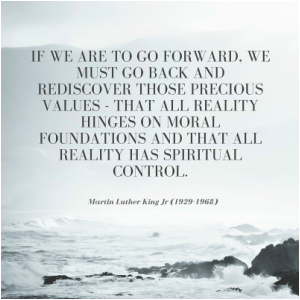 How does one properly pay tribute to a man like Rev. Martin Luther King Jr? I purposely include the "Rev" because I believe that the faith of the man was far more crucial to the greatness of the man than our pop culture recognizes. In fact, his Christian faith is sometimes largely absent. That is a huge aspect of Martin Luther King Jr. to omit. Despite the controversies surrounding his doctoral plagiarism, or his low simmering rage, or even his questionable Christian theology, he had some things straight. Martin Luther King Jr was not just a good man, a brave man, or a great freedom fighter - though he was of all those things even with his faults - he was a man who saw the world with moral and spiritual lenses. The quote in this post is one of my favorite quotes of all time, because of its enduring practicality for life. It is taken from a sermon King gave at a Baptist Church in Detroit, in February 1954. In this sermon he was addressing what he referred to as a relativistic ethic. Here is an excerpt for your edification: “All I’m trying to say is, our world hinges on moral foundations. God has made it so! God has made the universe to be based on a moral law. So long as man disobeys it he is revolting against God. That’s what we need in the world today-people who will stand for right and goodness. It’s not enough to know the intricacies of zoology and biology. But we must know the intricacies of law. It is not enough to know that two and two makes four. But we’ve got to know somehow that it’s right to be honest and just with our brothers. It’s not enough to know all about our philosophical and mathematical disciplines. But we’ve got to know the simple disciplines, of being honest and loving and just with all humanity. If we don’t learn it, we will destroy ourselves, by the misuse of our own powers.” Even with all of the practical organization, God-given oratorical talent, study and application of Mahatma Gandhi's peaceful resistance of injustice, Martin Luther King Jr. pointed to and preached the moral and spiritual realities of America's racism. Moral foundations and spiritual control defined the social issues of his day, and they still do. So, what does this have to do with my writing of an allegorical epic fantasy? First of all, there doesn't need to be much for me to take the chance to thank God for Martin Luther King Jr. But I can say that The Reaper's Seed is in many ways a product of my own core beliefs, some of which I share with King. There is no reality we face that is removed from moral implications or spiritual influence. The Reaper's Seed is an epic story of the struggle between good and evil, light and dark, love and hate. Even a fantasy series has moral foundations and spiritual control. That is why I love this quote: because of its enduring practically and truth. We've got more things to thank Martin Luther King Jr for than we can cover in one day a year, but here is at least one. 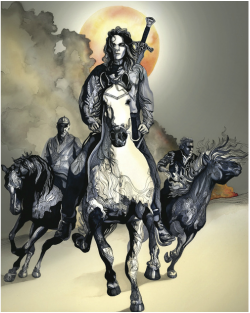 As a writer I believe the importance of story is not simply to entertain, and not simply to grow the imagination. While both of these are in fact the driving demand for fiction and the second is hugely important in a well-rounded human being, if the effect of a story ends there, something is missing. A story and its characters should develop in such a way that they challenge the reader to consider matters of great importance, specifically, ethics and morality. As a Christian I believe that the importance of Story in sharing the Christian faith is near and dear to the heart of God. I believe this for two main reasons: (1) All of Scripture is a story of the Love of God, culminating in the Good News and (2) Jesus himself often used parables to teach, which were in essence, stories. It is a human term to use in describing the Infinite One, but God is the ultimate Storyteller. God is the author of the greatest epic ever told. It includes the Creation, Eden, the Fall, the Flood, the Exodus, the establishment of the nation of Israel, the Temple, the Judges, the cyclical rise and fall of Israel’s Kings, the Dispersion, and all throughout it the Prophets and their message of how God was planning to redeem Adam's race once and for all. He promised, and He would deliver a Messiah – a Champion. This is why The Reaper’s Seed is an allegorical epic fantasy, as I like to call it. It is inspired by what has inspired my faith in God - His plan of Salvation for Adam's race. My own fascination with God's writing is one of the reasons - from among many - that I am such a huge fan of C.S. Lewis. I share his awe for the story of God's plan of Salvation for Mankind. The first of his works that I read was of course the Chronicles of Narnia. Even then, as a child, I knew that these books were an allegory of many of the aspects of the greatest epic, God's Story. The Chronicles of Narnia still entertain me, strengthen my imagination, and bring me to consider matters of ethics and morality. Even better, they've fed me soul. This is my goal, and remains my goal for The Reaper's Seed. I've sought to infuse this story with meaning, enough of it that it will feed the reader's soul. Either way, I can't rightly try for less with a literary hero like C.S. Lewis. |
Archives
February 2020
Categories |
